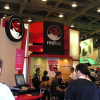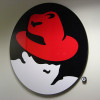Leverage 2.4 Linux Kernel To Make Linux Your Desktop OS
By: Infoworld.com newsletter by Nicholas Petreley
ALL OF THE TALK about the recently released Linux 2.4
kernel centers around the improvements that will make
Linux a better operating system for the enterprise. I
have not yet subjected the 2.4 kernel to intensive
server testing. But I do have a lot of confidence in
the 2.4 kernel for enterprise use, if for no other
reason than the fact that IBM and Oracle have already
loudly endorsed this new kernel.
These are not hollow endorsements solely for the
purpose of promoting Linux. I've spoken to IBM,
Oracle, and other major software companies about what
they want from Linux. And I can say with confidence
that the 2.4 kernel has answered a good portion of
their wants and needs, although not quite all of them.
There is definitely more work to be done. But 2.4 has
made very significant strides, and the kernel
developers are busily filling the remaining gaps. (You
can find a general summary of the advances in kernel
2.4 at
http://www.linuxtoday.com/news_story.php3?ltsn=2001-01-05-007-04-NW-LF-….)
As for my personal experience so far, I can say that
2.4 doesn't deliver what Linux needs to make Linux the
default desktop operating system of tomorrow. Let me
qualify that statement a bit, however, lest you get
the mistaken impression that my complaint is with the
kernel itself. It is not. But before I can properly
place the blame, I need to explain what it is the
kernel lacks.
The 2.4 kernel integrates USB support. (Limited USB
support has also been back-ported into some of the
earlier 2.2 kernels, but you usually have to compile
it into the kernel yourself. It is more convenient
to simply use a 2.4 kernel if you want USB support.)
But having USB support is not enough. Linux needs broad
support for the USB peripherals themselves. For
example, I have two USB-enabled digital cameras, and
neither of them works with Linux. They both work fine
with my copy of Windows 98SE.
Here's where the situation gets tricky. Commercial
operating systems such as Windows and the Mac (I
assume this is true of the Mac, anyway -- I'm not a
Mac user) include a number of USB drivers by default.
Naturally, many drivers are missing. But when a new
digital camera, printer, or scanner is released, you
can usually count on it to include a driver for
Windows and the Mac. You can't usually count on it to
include a driver for Linux, or just about any other
operating system for that matter.
The catch-22 is that this probably won't change until
Linux is more popular on the desktop. And Linux won't
penetrate the desktop in large numbers until more USB
drivers for consumer peripherals are available.
(Actually, Linux suffers from a few other problems
that stunt its desktop growth, such as printer
support, but generally the solution options are the
same.)
There is at least one way we may be able to solve this
problem and avoid the catch-22. Linux could really
benefit from a nonprofit or for-profit group whose job
it is to put pressure on vendors to include Linux
drivers with their products.
This group could coordinate an open-source approach for
providing drivers or in special cases help the company
create proprietary drivers.
But the idea would be to work with these vendors during
the product development phase to ensure that Linux
drivers ship on the CD-ROM included with the products.
That lends Linux greater credibility, and it reduces
the burden on the consumer, who would otherwise have
to download the drivers.
Better still, this group should encourage the vendors
to make deals with companies that sell Linux software.
For example, the group could encourage makers of
digital cameras to include a copy of the digital
content manager Compupic (http://www.photodex.com)
with every camera and work with Photodex to enable
Compupic to download images directly from the camera.
A product such as Compupic would be ideal because it
works on Windows, Macintosh, and Linux, so the bundle
wouldn't have to have separate programs for separate
platforms.
What do you think? Any volunteers out there to create
such an organization?
Nicholas Petreley is the founding editor of LinuxWorld
(http://www.linuxworld.com). Reach him at
nicholas@petreley.com.






































































